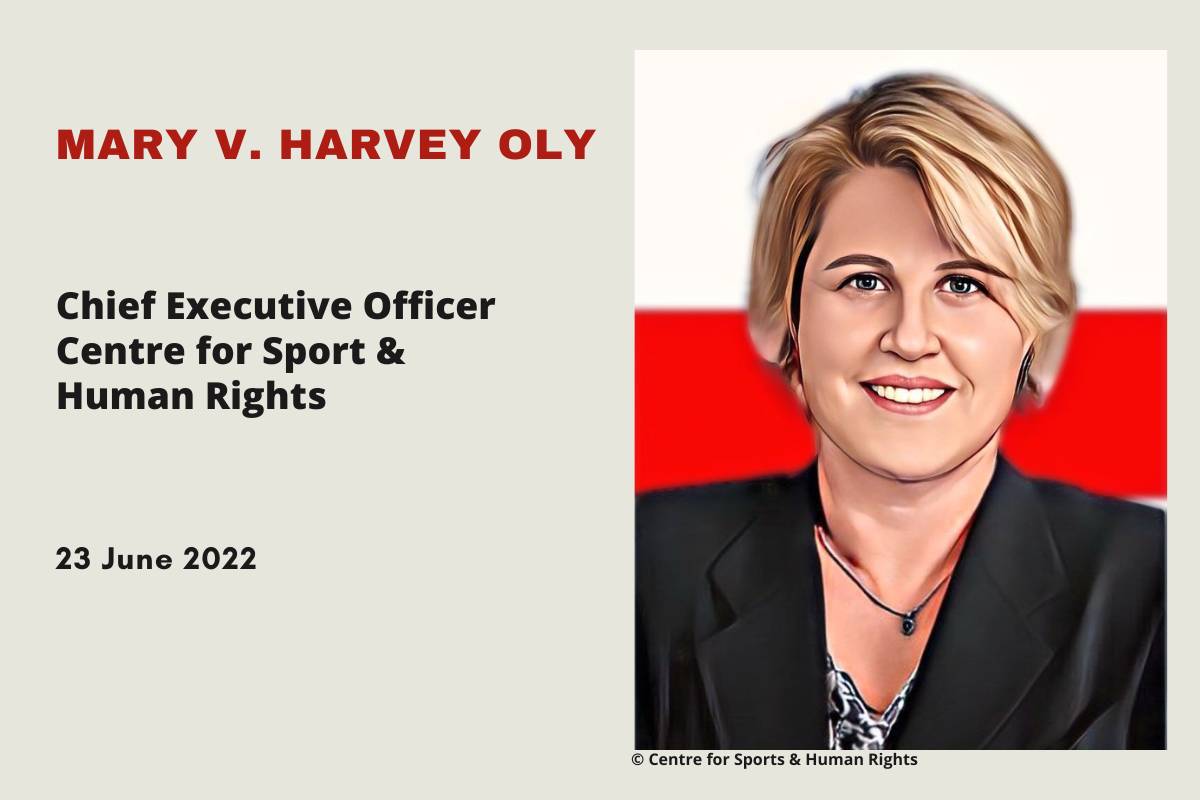The Interview | Mary V. Harvey OLY
 |
How would you present your organization in a few words? What entails your position? What is your goal? |
The Centre for Sport and Human Rights is a human rights organisation for the world of sport. Our mission is to advance a world of sport that fully respects and promotes human rights by generating awareness through education, building capacity through programmes and delivering impact through collective action. We pursue our mission by upholding and promoting the Sporting Chance Principles, involving those affected and strengthening accountability through engaging all stakeholders within the ecosystem of sport. We focus specifically on human rights risks related to day to day sport - or sporting events. If you read the news, you will find examples of human rights challenges in sport nearly every day, from debates on how to include transgender athletes to varying claims on worker deaths in Qatar to the current issue we see playing out with the new LIV Golf Series.
I’m the CEO of the organisation, having joined in 2019. I’m responsible for the strategic vision of the Centre, including facilitating the deliberations of the Centre’s multi-stakeholder Advisory Council, operational and financial management, stakeholder engagement, and good governance. My goal is to grow the Centre’s impact and financial footing.
 |
Among the concentration of actors in Geneva (IOs, NGOs, permanent missions, academia, and the private sector), who do you work with and how? |
We work with everyone in what we term as the Sport Ecosystem. These range from international sports governing bodies like FIFA, Governments such as that of Switzerland, key UN agencies OHCHR and the ILO, trade unions such as the ITUC, Sponsors like Coca-Cola and Broadcasters such as Sky, among many others. They are all represented in our Advisory Council, and we work with all stakeholders on a structural level to promote and respect human rights in sport. We help policymakers and IGOs understand how to better protect human rights in the sport sector, and help sport itself understand how to respect human rights in its governance and operations. We help sports bodies and others engage with stakeholders of those affected. The issues we have worked through with the ecosystem include athlete abuse, mental health & well-being, protection of children in sport, freedom of expression, and sportwashing. Mega-Sporting events like the FIFA World Cup and the Olympics bring many challenges which include worker welfare, press freedom, freedom of expression for fans, and so on.
 |
What are the strengths and weaknesses of Geneva with regards to the development of your activity? |
It’s only strengths! The Centre applies internationally recognised human rights norms and standards in all of our work - it’s one of our founding principles. Basing ourselves in Geneva - the international city of human rights - was therefore a strategic choice. We also have so many of our other stakeholders involved in sport - including all the international federations nearby making it the perfect place to bring people together for a more responsible sport.
 |
|
I hope we’ll be working together in a more equitable, fairer way. The inequalities which, for instance, the global south faces, can only be solved by genuine multi-party action. It’s the same with sport, and the most important single factor may well be taking on board the voices of affected people.
 |
|
I’m often asked: “Are there some countries that shouldn’t be allowed to host megasporting events?” Principle 10 of our Sporting Chance Principles states that bidding to host sporting events should be open to all. That said, it’s incumbent upon sport bodies to have and enforce human rights-related requirements to host sporting events, which should include: an assessment of risks including the voices of those impacted; proposals to mitigate those risks; processes to identify and mitigate risks as they change over time and finally, when things go wrong, what will you do to put it right? If these elements are a required part of the process to award sporting events, and if human rights-related elements become requirements of event contractual obligations (host city contracts, sourcing codes, etc) - then bidding and hosting should be open to all who agree to faithfully undertake this process.
